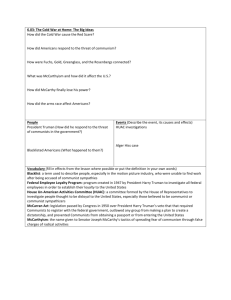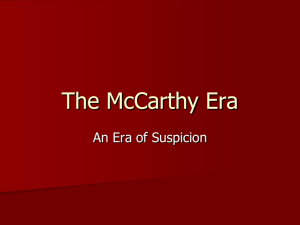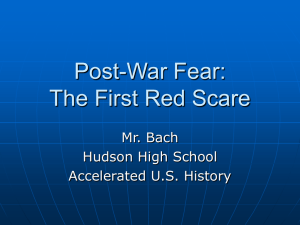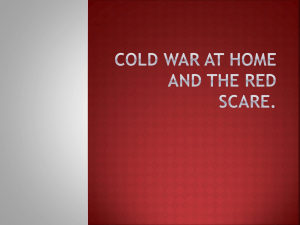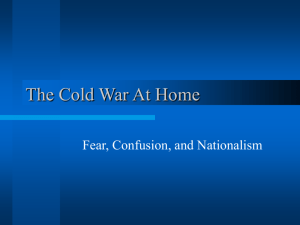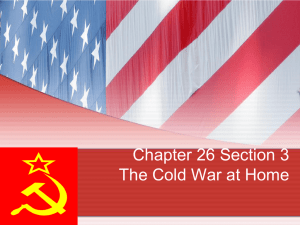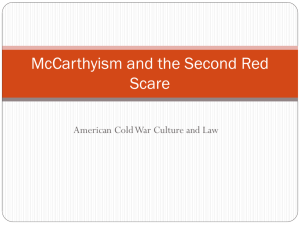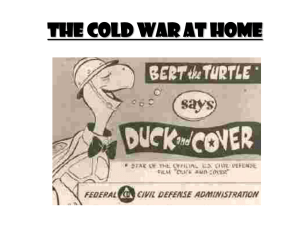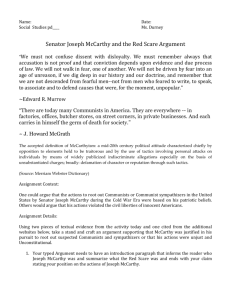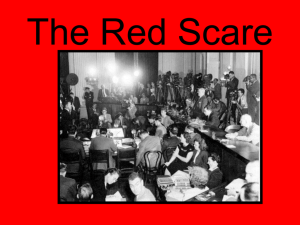The Red Scare
advertisement
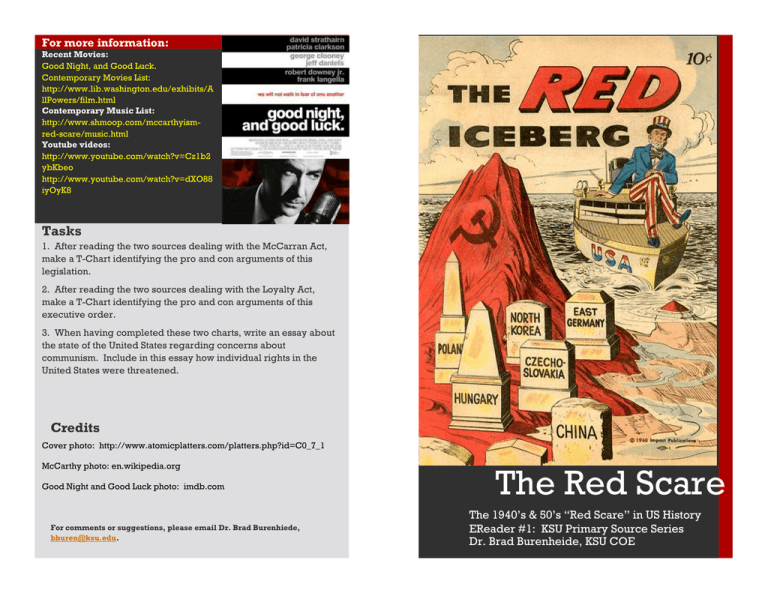
For more information: Recent Movies: Good Night, and Good Luck. Contemporary Movies List: http://www.lib.washington.edu/exhibits/A llPowers/film.html Contemporary Music List: http://www.shmoop.com/mccarthyismred-scare/music.html Youtube videos: http://www.youtube.com/watch?v=Cz1b2 ybKbeo http://www.youtube.com/watch?v=dXO88 iyOyK8 Tasks 1. After reading the two sources dealing with the McCarran Act, make a T-Chart identifying the pro and con arguments of this legislation. 2. After reading the two sources dealing with the Loyalty Act, make a T-Chart identifying the pro and con arguments of this executive order. 3. When having completed these two charts, write an essay about the state of the United States regarding concerns about communism. Include in this essay how individual rights in the United States were threatened. Credits Cover photo: http://www.atomicplatters.com/platters.php?id=C0_7_1 McCarthy photo: en.wikipedia.org Good Night and Good Luck photo: imdb.com For comments or suggestions, please email Dr. Brad Burenhiede, bburen@ksu.edu. The Red Scare The 1940’s & 50’s “Red Scare” in US History EReader #1: KSU Primary Source Series Dr. Brad Burenheide, KSU COE About the period… The Red Scare At the end of World War II, communism was seen as a great threat to the security of the world, especially nervous after the rise of the defeated fascist countries who were the aggressors of the war. All through America, there was a sense of unease of communism. As there was massive paranoia, government made steps to eliminate communism and resulted in action occurring to limit freedoms and attack anyone related to communism. Readings McCarthy’s Speech June 2, 1950 In this speech given in support the McCarran Internal Security Act, we get a view of McCarthy’s point of view of the threat to America. http://teachingamericanhistory.org/library/index.asp?document=858 Truman’s Veto of the McCarran Act Sept. 22, 1950 The McCarran Act was a piece of legislation that very controversial and Truman vetoed the bill. Congress overrode the veto. Some components of the act was found unconstitutional in 1993! Tailgunner Joe http://teachingamericanhistory.org/library/index.asp?document=859 Into this era of paranoia came Senator Joe McCarthy. McCarthy’s charisma and fervent tenor led to him becoming the loudest voice against communism and he prompted congressional hearings against alleged communists. The was interesting as people who may have dabbled with the idea of communism were tried in front of HUAC. Victims included college professors and even Hollywood actors. McCarthy overstepped when he held hearings against Army officials. Public sentiment turned against the movement. McCarthy fades away and dies of alcoholism at the end of it. Rep. Chester Holifield’s Speech on the Loyalty Act. June 27, 1947 The Readings Your readings for this module include two sides of the McCarran Act, an act designed to help prevent communism from infiltrating government and other institutions, but controversial as it gave government immense power. The other two deal with the start of the “Red Scare” as they deal with the Loyalty Act, which was designed to peg communists as disloyal, opening a route to prosecute those opposed to American Democracy. Representative Holifield spoke out about this Act as a danger to free speech and expression. http://teachingamericanhistory.org/library/index.asp?document=854 Truman’s Statement on the Loyalty Act November 14, 1947 Truman had issued Executive Order 9835 that required those employed by government to commit an oath of loyalty to the United States. http://teachingamericanhistory.org/library/index.asp?document=853 Who was Senator Joseph McCarthy? Born in Wisconsin in 1908, McCarthy earned a law degree and was a circuit judge when he served in WWII. Upon his return, he won a Senate seat in 1947. In the 1950’s amongst the height of the “Red Scare”, McCarthy led the crusade, claiming communists infiltrated the President’s staff, armed forces and government in general. In 1954, he pushed for hearings about communism in the Army, the hearings resulted in “McCarthyism” lost favor with the public. He died in 1957.
